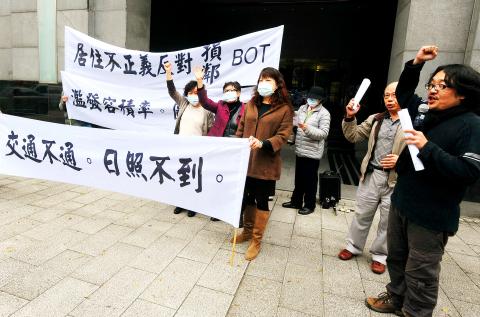Several residents in New Taipei City’s (新北市) New Banciao Special District project area yesterday protested in front of the Environmental Protection Administration (EPA) against an the expansion of a hotel project near their apartments that they say will block sunlight and create safety hazards due to narrow fire lanes.
Before the fourth Environmental Impact Assessment (EIA) specialist meeting to review the project took place yesterday afternoon, several residents from the local community gathered to implore the EIA committee members to halt the expansion of the project.
Peng Yang-kae (彭揚凱), secretary-general of Organization of Urban Re-s, an NGO focusing on urban policy and community based reform, said the build–operate–transfer project by a development companies and the New Taipei City government would see the construction of two hotels and a banquet hall in a 9,240m2 area near the Banciao Station.

Photo: Wang Yi-sung, Taipei Times
However, while the original plan was set at a 450 percent floor area ratio, the city government has since offered the development companies more floor area after they proposed to construct certain facilities, such as a skywalk and more parking spaces, he said, adding that the floor area ratio now amounts to nearly 780 percent.
“The original plan was to have about 300 hotel rooms, but now it increased to about 1,100 rooms, and the number of hotels has also increased from one to three in the same size area,” a resident surnamed Kuo (郭) said.
“We are worried that providing such crowded accommodation to so many people in such a small area will only cause the environment to deteriorate,” Kuo added.
A local resident surnamed Wang (王) in her early 60s said: “We have three generations living under the same roof, and I am worried that the construction of the hotel project could prevent fire engines from reaching our apartment if a fire breaks out.”
She also said that the planned hotel buildings would be 32 stories tall and would block all the sunlight and wind.
Most of the residents are not against the hotel project in itself, but what they see as its overexpansion, and are also concerned about potential fire safety problems, as well as environmental damage, Peng said.
Since the project is on public property, the government should also consider the public’s interest rather than only trying to maximize the benefits to companies, Peng added.
The project gained conditional approval at the EIA meeting. Conditions included leaving a 6m- wide space between the new buildings and the existing apartments, which must be kept clear, and a pledge to reduce carbon emissions by 40 percent.

A Taiwanese software developer has created a generative artificial intelligence (AI) model to help people use AI without exposing sensitive data, project head Huang Chung-hsiao (黃崇校) said yesterday. Huang, a 55-year-old coder leading a US-based team, said that concerns over data privacy and security in popular generative AIs such as ChatGPT and DeepSeek motivated him to develop a personal AI assistant named “Mei.” One of the biggest security flaws with cloud-based algorithms is that users are required to hand over personal information to access the service, giving developers the opportunity to mine user data, he said. For this reason, many government agencies and

The National Fire Agency on Thursday said a series of drills simulating a magnitude 8.5 earthquake would be held in September to enhance the government’s emergency response capabilities. Since earthquakes cannot be predicted, only by continuously promoting disaster prevention measures could Taiwan enhance its resilience to earthquakes, agency Director-General Hsiao Huan-chang (蕭煥章) said in a news release. The exercises would be held to mark annual National Disaster Prevention Day on Sept. 21, the aim of which is to test Taiwan’s preparedness and improve its earthquake resilience in case of a major temblor, Hsiao said. As part of those drills, an earthquake alert would

DEFENSE: The National Security Bureau promised to expand communication and intelligence cooperation with global partners and enhance its strategic analytical skills China has not only increased military exercises and “gray zone” tactics against Taiwan this year, but also continues to recruit military personnel for espionage, the National Security Bureau (NSB) said yesterday in a report to the Legislative Yuan. The bureau submitted the report ahead of NSB Director-General Tsai Ming-yen’s (蔡明彥) appearance before the Foreign and National Defense Committee today. Last year, the Chinese People’s Liberation Army (PLA) conducted “Joint Sword-2024A and B” military exercises targeting Taiwan and carried out 40 combat readiness patrols, the bureau said. In addition, Chinese military aircraft entered Taiwan’s airspace 3,070 times last year, up about

STRICTER ENFORCEMENT: Taipei authorities warned against drunk cycling after a sharp rise in riding under the influence, urging greater public awareness of its illegality Taipei authorities have issued a public warning urging people not to ride bicycles after consuming alcohol, following a sharp rise in riding under the influence (DUI) cases involving bicycles. Five hundred and seven people were charged with DUI last year while riding YouBikes, personal bicycles, or other self-propelled two-wheelers — a fourfold increase from the previous year, data released by the Taipei Police Department’s Traffic Division showed. Of these, 33 cases were considered severe enough to be prosecuted under “offenses against public safety,” the data showed. Under the Road Traffic Management and Penalty Act (道路交通管理處罰條例), bicycles — including YouBikes and other